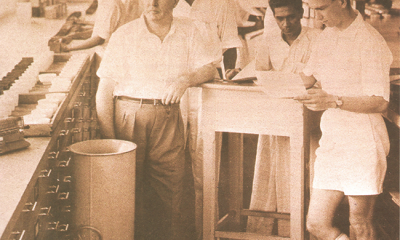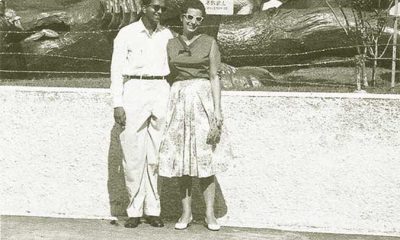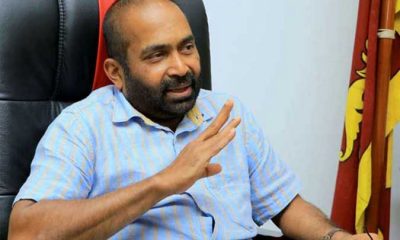Features
Life after A.F. Jones, marriage and separation

(Excerpted from the autobiography of Merrill. J. Fernando)
Having severed my connections with AF Jones, I gave myself a respite from an intense work life, literally a dawn to dusk grind, which I had sustained almost on a daily basis, over several years. In view of the nature of my disengagement from AFJ, I also took the precaution of advising all our customers around the world that I had dealt with, of the circumstances that led to my departure. Many responded to me, expressing their dissatisfaction with the manner in which they were being serviced after my exit.
There were also requests for me to return to AFJ with the assurance that I would be permitted to operate without any interference. However I did not consider that even for a moment,
During this rather troubled period, I was administered another shock, by a letter from the Inland Revenue Department, enclosing a punitive assessment for Rs. 50,000 in additional taxes coupled with a directive impounding my passport.
A close friend investigated the matter on my behalf and advised that the department had been sent a set of documents, relating to a personal investment of 600 pounds in shares in the UK; hence the assessment. I immediately realized how the file had got into the hands of the Inland Revenue.
A lady secretary at the American Embassy was the tenant of my ground floor flat and paid me a dollar rent, which I credited to a UK bank account.
From these funds I had invested in Ceylon tea estate company shares in the UK Stock Exchange. Joe Silva, a communist agitator who had created many problems at AFJ, had apparently, on the instructions of Nadesan, my supposed friend, sent an anonymous letter to the Exchange Controller, alleging that I had overseas investments. When the Exchange Controller requested me to submit details of such investment, I showed the documents to Nadesan, who drafted a reply on my behalf. He also kept in his custody the related file of documents – for safekeeping, he said – and it was that file which had found its way to the Inland Revenue.
However, Mr. Mithrasena, the Inland Revenue official who inquired into the matter, was quite satisfied with my explanation regarding the overseas account. He also assisted me in obtaining my statutory dues from the company, by ordering the company to immediately remit the relevant funds to the Inland Revenue, which he released to me soon thereafter.
During this period I had a couple of offers from companies overseas, including one in the United States of America, the latter through a friend of mine, to join his company as a partner. However, I was still passionate about the tea industry in Ceylon and, despite the disappointment with AFJ, I was determined to continue with the tea export business.
Another beginning – Merrill J. Fernando & Co. Ltd.
S_ I. Jafferjee of Jafferjee Brothers, an old and well-established family tea export company, was my good friend and had been very supportive at me during my disputes with the AFJ Board. No sooner I severed my active connection with AFJ, he invited me to join him in his business. I was grateful to him for his offer, but instead, in 1962, I launched a small company of my own, ‘Ceylon Tea Exports,’ operating out of the Jafferjee Brothers’ offices and also using their tea facilities.
The business grew steadily until a major strike by the workers of Jafferjee Brothers disrupted my operations as well. My personal appeals to the strike leaders failed to resolve the issues in contention, even though I went to the extent of visiting their homes to discuss the matter.
Finally, after discussion with “SI,” I moved out of the Jafferjee premises and set up my office at 188, Vauxhall Street, Colombo. At the same time, I also rented warehousing from S. H. Moosajee & Co, at Rs. 15 a square foot. That location is today Park Street Mews, home to a few upscale restaurants. The business of Ceylon Tea Exports was transferred to Merrill J. Fernando Company, which I had set up in 1962.
The beneficial impact of Mr. Gash’s (of National and Grindlays Bank) interventions in my business life were such that I always considered him to have been sent by God! He financed all my operations with the utmost confidence, even when business circumstances were unfavourable. In one instance, during a strike period which held up tea shipments, causing cash flows to dwindle, I visited the bank to seek temporary bridging finance, over and above the normal operational funding. However, his two assistants dissuaded me from going to Gash with my request as they were of the view that he would be placed in a difficult situation.
Seeking an alternative, I walked across to Eastern Bank — today Standard Chartered Bank — and submitted my request to its Head, Peter Bolander who, at our frequent social meetings, would solicit business from me. He asked for time to look up his rule book and then agreed to give me a substantial overdraft facility. When Gash’s assistants heard about my discussions with Bolander, they asked me not to mention my new relationship with the Eastern Bank as that would upset Gash!
Subsequently, I was compelled to take my business away from Grindlays, as its Head Office in Calcutta had taken up the position that I was over-trading and, hence, constituted a risk to the bank. Though Gash and his senior managers explained to their supervisors in Calcutta that I carried out a very efficient operation, in which the product was converted to cash much faster than in any other similar operation, the Calcutta office refused to change its view. By the time I reluctantly moved my business out of Grindlays Mr. Gash had also retired.
Messrs. Gunatilleke and Kularatne at People’s Bank solicited my business, even offering to finance the settling of my old debts, apparently a concession which they normally did not extend to other businessmen. However, I had to decline their kind offer as Grindlays arranged with Hatton National Bank to take over my account and its then Head, Mr. Dharmarajah, offered me the same generous terms extended to me by Grindlays. At Hatton National I dealt with L. S. D. “Bill” Peiris, a very sensible and fair-minded banker, with whom I enjoyed an excellent business relationship.
At that time most banks employed a cumbersome system to lend funds against export orders. This did not suit my operational style and I proposed to the bank a different system which also provided adequate protection to the bank, in the case of non-performance on my part. I gave Bill Peiris a weekly statement of confirmed orders with the corresponding funding requirements and that was accepted by him.
However, whilst I diligently honoured all my commitments to the bank, I had serious disagreements with one executive, the late Gaston Gunawardene, who was in actual fact an administrator and not a banker. His criticism of and intrusion into my operations were so frequent and vexing that I finally moved out of Hatton National, despite Dharmarajah’s appeals for me to stay on. I had to explain to him that I found it impossible to work with Gunawardene.
This depressing reliance on institutional funding for one’s operations taught me another useful lesson, very early in my life as a single entrepreneur – to build a strong cash base which would minimize dependence on loan and overdraft assistance which, even at their most beneficial, are still exploitative. I became frugal in my expenditure, saved as much as possible, and exercised great selectivity in my investments.
As a result of prudent cash and investment management, within a couple of decades I was able to build up substantial savings. The latter, invested in gilt-edged securities, provided me the stability to view funding assistance for my operations as a matter of choice and gave me the ability to fund any new business initiative from the revenue generated by my own operations.
Marriage and family
In 1964, I married Devika Jayawickrema, who came from a politically-prominent southern family. Her father, Major Montague Jayawickrema, was a proprietary planter and land-owner in the south. He had also been an active politician since 1936 and had represented the Weligama electorate on several occasions, between 1952 and 1987. He had been the Minister of Transport and Public Works from 1952-1956 and, later, from 1977-1987, the Minister of Public Administration, Home Affairs, and Plantation Industries.
Devika had been raised in a family environment in which the main preoccupations were politics and public service. As a result, the deeply-entrenched family cohesiveness and religiosity, which were both the defining features and overarching influences of my upbringing, were absent from her persona. Her outlook and worldview had been fashioned in a family ambience in which interpersonal relationships, attachments, and obligations were not as deep as in mine. These sharply-contradictory features in our respective personalities and value systems had their impact later on in our relationship.
At the time of my marriage I was living in a comfortable apartment on Turret Road and I planned to continue to live there. However, my new father-in-law was very insistent that I move into a fully-furnished home he had built for his daughter. In fact, he went to the extent of sending a few of my friends, including Bennet Medonza, to persuade me to move into this house, which was located between his house and that of Kishani, his second daughter. Finally I conceded to his appeals and moved in, but surprisingly found that instead of the fully-furnished home I was told to expect, it had only a refrigerator. I furnished it very satisfactorily on my own though.
Children arrive
Our eldest, Malik, was born on February 6, 1966, followed by Dilhan on May 29, 1968. Very early on I found out that Devika’s concept of parenting was quite different from mine, the latter fashioned within a strict Catholic upbringing, a composite of dedicated parental care on the one hand and the equally compelling response by the child on the other. The dictates of the religion that they were born to governed every aspect of my parents’ lives, even in the home. Other distractions, whether social or professional and however attractive or demanding, were not permitted to affect those responsibilities.
Thus, I evaluated Devika’s handling of our two children against the backdrop of my personal childhood experiences. During this period I was also deeply involved in my growing business, which, despite my commitment in both time and effort, was still beset by a number of operational problems. Given those circumstances, perhaps I expected a greater contribution from Devika in regard to the children, to offset any possible limitations on my part on account of the demands of my business. In short, I expected our two sons to be brought up in the same way I was raised in my parents’ home.
Eventually, my decision to end the relationship was made on the basis that the raising of my children, according to my perceptions of what was best for them, was not possible within the context of my marriage.
Separation
I purchased a comfortable and modern two-storeyed house at 61, Jawatte Road, soon after which I made a quick business trip to Europe. I was quite surprised when Devika followed me to London, possibly at the urging of her parents with advice to mend fences. However, regretfully, I advised her that my mind was made up and that she needed to chart her own course for the future.
On my return to Sri Lanka I refurbished the new home and soon settled into it, accompanied by the two children, together with their two carers, personal furniture, and the ever-faithful Alice, the best chef I have ever known apart from my mother. Thus began a completely new existence which, with very few changes, continues to this day. When Devika and I separated, Malik was four and Dilhan two.
I was both surprised and grateful that the many friends I made during my marriage continued to be my friends even afterwards. They extended to me the same love and affection as before and were also extremely helpful to me in various ways. They gave me much-needed moral support at a difficult time and still remain my close friends.
Whilst there were many such, without detracting from their caring in any way, I must make special mention of Nordeen and Shirin Esufally, who were by my side on every step of a difficult journey and were my dear, lifelong friends until their departure from this world. They opened their hearts to me, providing me exceptional love and care, sent me meals frequently, and gave me unrestricted access to their home and staff. Nordeen was my tennis partner for many years. Their children continue to be equally close to me to this day.
On conclusion of the divorce proceedings, I was granted custody of our two sons with access for the mother once a fortnight. From what I gathered, that too was not a satisfactory experience for them, but did not pursue it or try to change it, apprehensive of the impact it would have on them.
A few months later I was fortunate in being able to purchase a beautiful home in Gower Street, an old-fashioned house set in a sprawling garden with large trees and flowering plants. Both Malik and Dilhan loved its spaciousness; within, they had separate bedrooms with attached baths, toilets and a playroom and outside, the extensive shaded space where they were able to play various games with friends. Every weekend the house was full of my sons’ friends.
I recall that Malik preferred to read books in his room rather than play. Whilst playing cricket, Dilhan would display his resentment at being dismissed whilst batting, sometimes breaking his wicket, a demonstration of temperament he fortunately outgrew!
Features
Following the Money: Tourism’s revenue crisis behind the arrival numbers – PART II

(Article 2 of the 4-part series on Sri Lanka’s tourism stagnation)
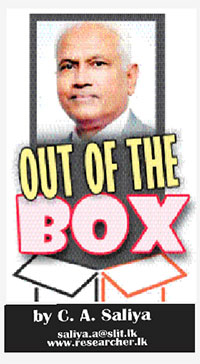 If Sri Lanka’s tourism story were a corporate income statement, the top line would satisfy any minister. Arrivals went up 15.1%, targets met, records broke. But walk down the statement and the story darkens. Revenue barely budges. Per-visitor yield collapses. The money that should accompany all those arrivals has quietly vanished, or, more accurately, never materialised.
If Sri Lanka’s tourism story were a corporate income statement, the top line would satisfy any minister. Arrivals went up 15.1%, targets met, records broke. But walk down the statement and the story darkens. Revenue barely budges. Per-visitor yield collapses. The money that should accompany all those arrivals has quietly vanished, or, more accurately, never materialised.
This is not a recovery. It is a volume trap, more tourists generating less wealth, with policymakers either oblivious to the math or unwilling to confront it.
Problem Diagnosis: The Paradox of Plenty:
The numbers tell a brutal story.
Read that again: arrivals grew 15.1% year-on-year, but revenue grew only 1.6%. The average tourist in 2025 left behind $181 less than in 2024, an 11.7% decline. Compared to 2018, the drop is even sharper. In real terms, adjusting for inflation and currency depreciation, each visitor in 2025 generates approximately 27-30% less revenue than in 2018, despite Sri Lanka being “cheaper” due to the rupee’s collapse. This is not marginal variance. This is structural value destruction. (See Table 1)

The math is simple and damning: Sri Lanka is working harder for less. More tourists, lower yield, thinner margins. Why? Because we have confused accessibility with competitiveness. We have made ourselves “affordable” through currency collapse and discounting, not through value creation.
Root Causes: The Five Mechanisms of Value Destruction
The yield collapse is not random. It is the predictable outcome of specific policy failures and market dynamics.
1. Currency Depreciation as False Competitiveness
The rupee’s collapse post-2022 has made Sri Lanka appear “cheap” to foreigners. A hotel room priced at $100 in 2018 might cost $70-80 in effective purchasing power today due to depreciation. Tour operators have aggressively discounted to fill capacity during the crisis recovery.
This creates the illusion of competitiveness. Arrivals rise because we are a “bargain.” But the bargain is paid for by domestic suppliers, hotels, transport providers, restaurants, staff, whose input costs (energy, food, imported goods) have skyrocketed in rupee terms while room rates lag in dollar terms.
The transfer is explicit: value flows from Sri Lankan workers and businesses to foreign tourists. The tourism “recovery” extracts wealth from the domestic economy rather than injecting it.
2. Market Composition Shift: Trading European Yields for Asian Volumes
SLTDA data shows a deliberate (or accidental—the policy opacity makes it unclear) shift in source markets. (See Table 2)

The problem is not that we attract Indians or Russians, it is that we attract them without strategies to optimise their yield. As the next article in this series will detail, Indian tourists average approximately 5.27 nights compared to the 8-9 night overall average, with lower per-day spending. We have built recovery on volume from price-sensitive segments rather than value from high-yield segments.
This is a choice, though it appears no one consciously made it. Visa-free entry, aggressive India-focused marketing, and price positioning have tilted the market mix without any apparent analysis of revenue implications.
3. Length of Stay Decline and Activity Compression
Average length of stay has compressed. While overall averages hover around 8-9 nights in recent years, the composition matters. High-yield European and North American tourists who historically spent 10-12 nights are now spending 7-9. Indian tourists spend 5-6 nights.
Shorter stays mean less cumulative spending, fewer experiences consumed, less distribution of value across the tourism chain. A 10-night tourist patronises multiple regions, hotels, guides, restaurants. A 5-night tourist concentrates spending in 2-3 locations, typically Colombo, one beach, one cultural site.
The compression is driven partly by global travel trends (shorter, more frequent trips) but also by Sri Lanka’s failure to develop compelling multi-day itineraries, adequate inter-regional connectivity, and differentiated regional experiences. We have not given tourists reasons to stay longer.
4. Infrastructure Decay and Experience Degradation
Tourists pay for experiences, not arrivals. When experiences degrade, airport congestion, poor road conditions, inadequate facilities at cultural sites, safety concerns, spending falls even if arrivals hold.
The 2024-2025 congestion at Bandaranaike International Airport, with reports of tourists nearly missing flights due to bottlenecks, is the visible tip. Beneath are systemic deficits: poor last-mile connectivity to tourism sites, deteriorating heritage assets, unregistered businesses providing sub-standard services, outbound migration of trained staff.
An ADB report notes that tourism authorities face resource shortages and capital expenditure embargoes, preventing even basic facility improvements at major revenue generators like Sigiriya (which charges $36 per visitor and attracts 25% of all tourists). When a site generates substantial revenue but lacks adequate lighting, safety measures, and visitor facilities, the experience suffers, and so does yield.
5. Leakage: The Silent Revenue Drain
Tourism revenue figures are gross. Net foreign exchange contributions after leakages, is rarely calculated or published.
Leakages include:
· Imported food, beverages, amenities in hotels (often 30-40% of operating costs)
· Foreign ownership and profit repatriation
· International tour operators taking commissions upstream (tourists book through foreign platforms that retain substantial margins)
· Unlicensed operators and unregulated businesses evading taxes and formal banking channels
Industry sources estimate leakages can consume 40-60% of gross tourism revenue in developing economies with weak regulatory enforcement. Sri Lanka has not published comprehensive leakage studies, but all indicators, weak licensing enforcement, widespread informal sector activity, foreign ownership concentration in resorts, suggest leakages are substantial and growing.
The result: even the $3.22 billion headline figure overstates actual net contribution to the economy.
The Way Forward: From Volume to Value
Reversing the yield collapse requires
systematic policy reorientation, from arrivals-chasing to value-building.
First
, publish and track yield metrics as primary KPIs. SLTDA should report:
· Revenue per visitor (by source market, by season, by purpose)
· Average daily expenditure (disaggregated by accommodation, activities, food, retail)
· Net foreign exchange contribution after documented leakages
· Revenue per room night (adjusted for real exchange rates)
Make these as visible as arrival numbers. Hold policy-makers accountable for yield, not just volume.
Second
, segment markets explicitly by yield potential. Stop treating all arrivals as equivalent. Conduct market-specific yield analyses:
· Which markets spend most per day?
· Which stays longest?
· Which distributes spending across regions vs. concentrating in Colombo/beach corridors?
· Which book is through formal channels vs. informal operators?
Target marketing and visa policies accordingly. If Western European tourists spend $250/day for 10 nights while another segment spends $120/day for 5 nights, the revenue difference ($2,500 vs. $600) dictates where promotional resources should flow.
Third
, develop multi-day, multi-region itineraries with compelling value propositions. Tourists extend stays when there are reasons to stay. Create integrated experiences:
· Cultural triangle + beach + hill country circuits with seamless connectivity
· Themed tours (wildlife, wellness, culinary, adventure) requiring 10+ days
· Regional spread of accommodation and experiences to distribute economic benefits
This requires infrastructure investment, precisely what has been neglected.
Fourth
, regulations to minimise leakages. Enforce licensing for tourism businesses. Channel bookings through formal operators registered with commercial banks. Tax holiday schemes should prioritise investments that maximise local value retention, staff training, local sourcing, domestic ownership.
Fifth
, stop using currency depreciation as a competitive strategy. A weak rupee makes Sri Lanka “affordable” but destroys margins and transfers wealth outward. Real competitiveness comes from differentiated experiences, quality standards, and strategic positioning, not from being the “cheapest” option.
The Hard Math: What We’re Losing
Let’s make the cost explicit. If Sri Lanka maintained 2018 per-visitor spending levels ($1,877) on 2025 arrivals (2.36 million), revenue would be approximately $4.43 billion, not $3.22 billion. The difference: $1.21 billion in lost revenue, value that should have been generated but wasn’t.
That $1.21 billion is not a theoretical gap. It represents:
· Wages not paid
· Businesses not sustained
· Taxes not collected
· Infrastructure not funded
· Development not achieved
This is the cost of volume-chasing without yield discipline. Every year we continue this model; we lock in value destruction.
The Policy Failure: Why Arrivals Theater Persists
Why do policymakers fixate on arrivals when revenue tells the real story?
Because arrivals are politically legible. A minister can tout “record tourist numbers” in a press conference. Revenue per visitor requires explanation, context, and uncomfortable questions about policy choices.
Arrivals are easy to manipulate upward, visa-free entry, aggressive discounting, currency depreciation. Yield is hard, it requires product development, market curation, infrastructure investment, regulatory enforcement.
Arrivals theater is cheaper and quicker than strategic transformation. But this is governance failure at its most fundamental. Tourism’s contribution to economic recovery is not determined by how many planes land but by how much wealth each visitor creates and retains domestically. Every dollar spent celebrating arrival records while ignoring yield collapse is a waste of dollars.
The Uncomfortable Truth
Sri Lanka’s tourism “boom” is real in volume, but it is a value bust. We are attracting more tourists and generating less wealth. The industry is working harder for lower returns. Margins are compressed, staff are paid less in real terms, infrastructure decays, and the net contribution to national recovery underperforms potential.
This is not sustainable. Eventually, operators will exit. Quality will degrade further. The “affordable” positioning will shift to “cheap and deteriorating.” The volume will follow yield down.
We have two choices: acknowledge the yield crisis and reorient policy toward value creation or continue arrivals theater until the hollowness becomes undeniable.
The money has spoken. The question is whether anyone in power is listening.
Features
Misinterpreting President Dissanayake on National Reconciliation
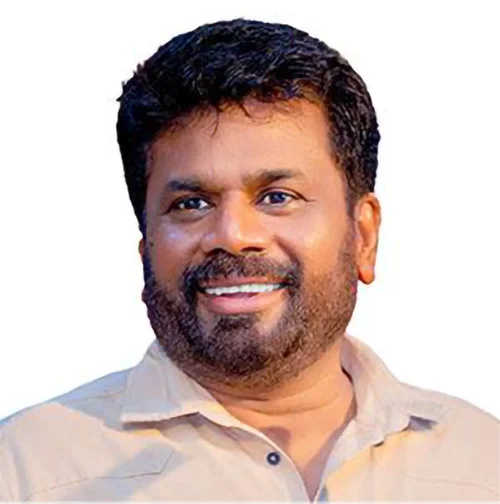
President Anura Kumara Dissanayake has been investing his political capital in going to the public to explain some of the most politically sensitive and controversial issues. At a time when easier political choices are available, the president is choosing the harder path of confronting ethnic suspicion and communal fears. There are three issues in particular on which the president’s words have generated strong reactions. These are first with regard to Buddhist pilgrims going to the north of the country with nationalist motivations. Second is the controversy relating to the expansion of the Tissa Raja Maha Viharaya, a recently constructed Buddhist temple in Kankesanturai which has become a flashpoint between local Tamil residents and Sinhala nationalist groups. Third is the decision not to give the war victory a central place in the Independence Day celebrations.
Even in the opposition, when his party held only three seats in parliament, Anura Kumara Dissanayake took his role as a public educator seriously. He used to deliver lengthy, well researched and easily digestible speeches in parliament. He continues this practice as president. It can be seen that his statements are primarily meant to elevate the thinking of the people and not to win votes the easy way. The easy way to win votes whether in Sri Lanka or elsewhere in the world is to rouse nationalist and racist sentiments and ride that wave. Sri Lanka’s post independence political history shows that narrow ethnic mobilisation has often produced short term electoral gains but long term national damage.
Sections of the opposition and segments of the general public have been critical of the president for taking these positions. They have claimed that the president is taking these positions in order to obtain more Tamil votes or to appease minority communities. The same may be said in reverse of those others who take contrary positions that they seek the Sinhala votes. These political actors who thrive on nationalist mobilisation have attempted to portray the president’s statements as an abandonment of the majority community. The president’s actions need to be understood within the larger framework of national reconciliation and long term national stability.
Reconciler’s Duty
When the president referred to Buddhist pilgrims from the south going to the north, he was not speaking about pilgrims visiting long established Buddhist heritage sites such as Nagadeepa or Kandarodai. His remarks were directed at a specific and highly contentious development, the recently built Buddhist temple in Kankesanturai and those built elsewhere in the recent past in the north and east. The temple in Kankesanturai did not emerge from the religious needs of a local Buddhist community as there is none in that area. It has been constructed on land that was formerly owned and used by Tamil civilians and which came under military occupation as a high security zone. What has made the issue of the temple particularly controversial is that it was established with the support of the security forces.
The controversy has deepened because the temple authorities have sought to expand the site from approximately one acre to nearly fourteen acres on the basis that there was a historic Buddhist temple in that area up to the colonial period. However, the Tamil residents of the area fear that expansion would further displace surrounding residents and consolidate a permanent Buddhist religious presence in the present period in an area where the local population is overwhelmingly Hindu. For many Tamils in Kankesanturai, the issue is not Buddhism as a religion but the use of religion as a vehicle for territorial assertion and demographic changes in a region that bore the brunt of the war. Likewise, there are other parts of the north and east where other temples or places of worship have been established by the military personnel in their camps during their war-time occupation and questions arise regarding the future when these camps are finally closed.
There are those who have actively organised large scale pilgrimages from the south to make the Tissa temple another important religious site. These pilgrimages are framed publicly as acts of devotion but are widely perceived locally as demonstrations of dominance. Each such visit heightens tension, provokes protest by Tamil residents, and risks confrontation. For communities that experienced mass displacement, military occupation and land loss, the symbolism of a state backed religious structure on contested land with the backing of the security forces is impossible to separate from memories of war and destruction. A president committed to reconciliation cannot remain silent in the face of such provocations, however uncomfortable it may be to challenge sections of the majority community.
High-minded leadership
The controversy regarding the president’s Independence Day speech has also generated strong debate. In that speech the president did not refer to the military victory over the LTTE and also did not use the term “war heroes” to describe soldiers. For many Sinhala nationalist groups, the absence of these references was seen as an attempt to diminish the sacrifices of the armed forces. The reality is that Independence Day means very different things to different communities. In the north and east the same day is marked by protest events and mourning and as a “Black Day”, symbolising the consolidation of a state they continue to experience as excluding them and not empathizing with the full extent of their losses.
By way of contrast, the president’s objective was to ensure that Independence Day could be observed as a day that belonged to all communities in the country. It is not correct to assume that the president takes these positions in order to appease minorities or secure electoral advantage. The president is only one year into his term and does not need to take politically risky positions for short term electoral gains. Indeed, the positions he has taken involve confronting powerful nationalist political forces that can mobilise significant opposition. He risks losing majority support for his statements. This itself indicates that the motivation is not electoral calculation.
President Dissanayake has recognized that Sri Lanka’s long term political stability and economic recovery depend on building trust among communities that once peacefully coexisted and then lived through decades of war. Political leadership is ultimately tested by the willingness to say what is necessary rather than what is politically expedient. The president’s recent interventions demonstrate rare national leadership and constitute an attempt to shift public discourse away from ethnic triumphalism and toward a more inclusive conception of nationhood. Reconciliation cannot take root if national ceremonies reinforce the perception of victory for one community and defeat for another especially in an internal conflict.
BY Jehan Perera
Features
Recovery of LTTE weapons
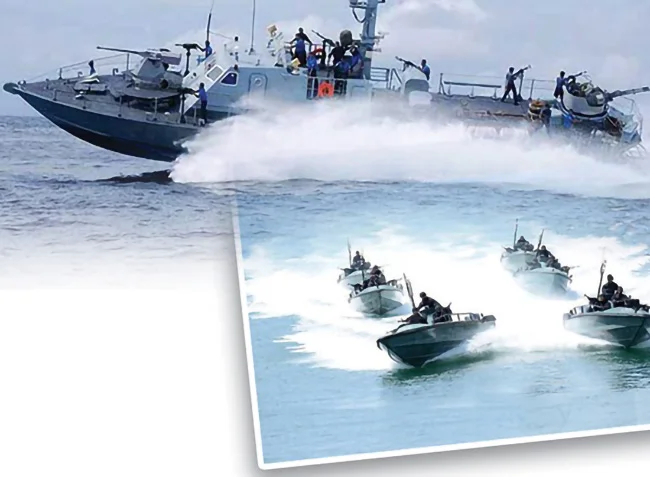
I have read a newspaper report that the Special Task Force of Sri Lanka Police, with help of Military Intelligence, recovered three buried yet well-preserved 84mm Carl Gustaf recoilless rocket launchers used by the LTTE, in the Kudumbimalai area, Batticaloa.
These deadly weapons were used by the LTTE SEA TIGER WING to attack the Sri Lanka Navy ships and craft in 1990s. The first incident was in February 1997, off Iranativu island, in the Gulf of Mannar.
Admiral Cecil Tissera took over as Commander of the Navy on 27 January, 1997, from Admiral Mohan Samarasekara.
The fight against the LTTE was intensified from 1996 and the SLN was using her Vanguard of the Navy, Fast Attack Craft Squadron, to destroy the LTTE’s littoral fighting capabilities. Frequent confrontations against the LTTE Sea Tiger boats were reported off Mullaitivu, Point Pedro and Velvetiturai areas, where SLN units became victorious in most of these sea battles, except in a few incidents where the SLN lost Fast Attack Craft.

Carl Gustaf recoilless rocket launchers
The intelligence reports confirmed that the LTTE Sea Tigers was using new recoilless rocket launchers against aluminium-hull FACs, and they were deadly at close quarter sea battles, but the exact type of this weapon was not disclosed.
The following incident, which occurred in February 1997, helped confirm the weapon was Carl Gustaf 84 mm Recoilless gun!
DATE: 09TH FEBRUARY, 1997, morning 0600 hrs.
LOCATION: OFF IRANATHIVE.
FACs: P 460 ISRAEL BUILT, COMMANDED BY CDR MANOJ JAYESOORIYA
P 452 CDL BUILT, COMMANDED BY LCDR PM WICKRAMASINGHE (ON TEMPORARY COMMAND. PROPER OIC LCDR N HEENATIGALA)
OPERATED FROM KKS.
CONFRONTED WITH LTTE ATTACK CRAFT POWERED WITH FOUR 250 HP OUT BOARD MOTORS.
TARGET WAS DESTROYED AND ONE LTTE MEMBER WAS CAPTURED.
LEADING MARINE ENGINEERING MECHANIC OF THE FAC CAME UP TO THE BRIDGE CARRYING A PROJECTILE WHICH WAS FIRED BY THE LTTE BOAT, DURING CONFRONTATION, WHICH PENETRATED THROUGH THE FAC’s HULL, AND ENTERED THE OICs CABIN (BETWEEN THE TWO BUNKS) AND HIT THE AUXILIARY ENGINE ROOM DOOR AND HAD FALLEN DOWN WITHOUT EXPLODING. THE ENGINE ROOM DOOR WAS HEAVILY DAMAGED LOOSING THE WATER TIGHT INTEGRITY OF THE FAC.
THE PROJECTILE WAS LATER HANDED OVER TO THE NAVAL WEAPONS EXPERTS WHEN THE FACs RETURNED TO KKS. INVESTIGATIONS REVEALED THE WEAPON USED BY THE ENEMY WAS 84 mm CARL GUSTAF SHOULDER-FIRED RECOILLESS GUN AND THIS PROJECTILE WAS AN ILLUMINATER BOMB OF ONE MILLION CANDLE POWER. BUT THE ATTACKERS HAS FAILED TO REMOVE THE SAFETY PIN, THEREFORE THE BOMB WAS NOT ACTIVATED.

Sea Tigers
Carl Gustaf 84 mm recoilless gun was named after Carl Gustaf Stads Gevärsfaktori, which, initially, produced it. Sweden later developed the 84mm shoulder-fired recoilless gun by the Royal Swedish Army Materiel Administration during the second half of 1940s as a crew served man- portable infantry support gun for close range multi-role anti-armour, anti-personnel, battle field illumination, smoke screening and marking fire.
It is confirmed in Wikipedia that Carl Gustaf Recoilless shoulder-fired guns were used by the only non-state actor in the world – the LTTE – during the final Eelam War.
It is extremely important to check the batch numbers of the recently recovered three launchers to find out where they were produced and other details like how they ended up in Batticaloa, Sri Lanka?
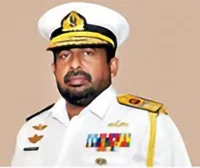 By Admiral Ravindra C. Wijegunaratne
By Admiral Ravindra C. Wijegunaratne
WV, RWP and Bar, RSP, VSV, USP, NI (M) (Pakistan), ndc, psn, Bsc (Hons) (War Studies) (Karachi) MPhil (Madras)
Former Navy Commander and Former Chief of Defence Staff
Former Chairman, Trincomalee Petroleum Terminals Ltd
Former Managing Director Ceylon Petroleum Corporation
Former High Commissioner to Pakistan
-

 Features3 days ago
Features3 days agoMy experience in turning around the Merchant Bank of Sri Lanka (MBSL) – Episode 3
-

 Business4 days ago
Business4 days agoZone24x7 enters 2026 with strong momentum, reinforcing its role as an enterprise AI and automation partner
-

 Business3 days ago
Business3 days agoRemotely conducted Business Forum in Paris attracts reputed French companies
-

 Business3 days ago
Business3 days agoFour runs, a thousand dreams: How a small-town school bowled its way into the record books
-

 Business3 days ago
Business3 days agoComBank and Hayleys Mobility redefine sustainable mobility with flexible leasing solutions
-

 Business4 days ago
Business4 days agoHNB recognized among Top 10 Best Employers of 2025 at the EFC National Best Employer Awards
-

 Editorial6 days ago
Editorial6 days agoAll’s not well that ends well?
-

 Business4 days ago
Business4 days agoGREAT 2025–2030: Sri Lanka’s Green ambition meets a grid reality check





